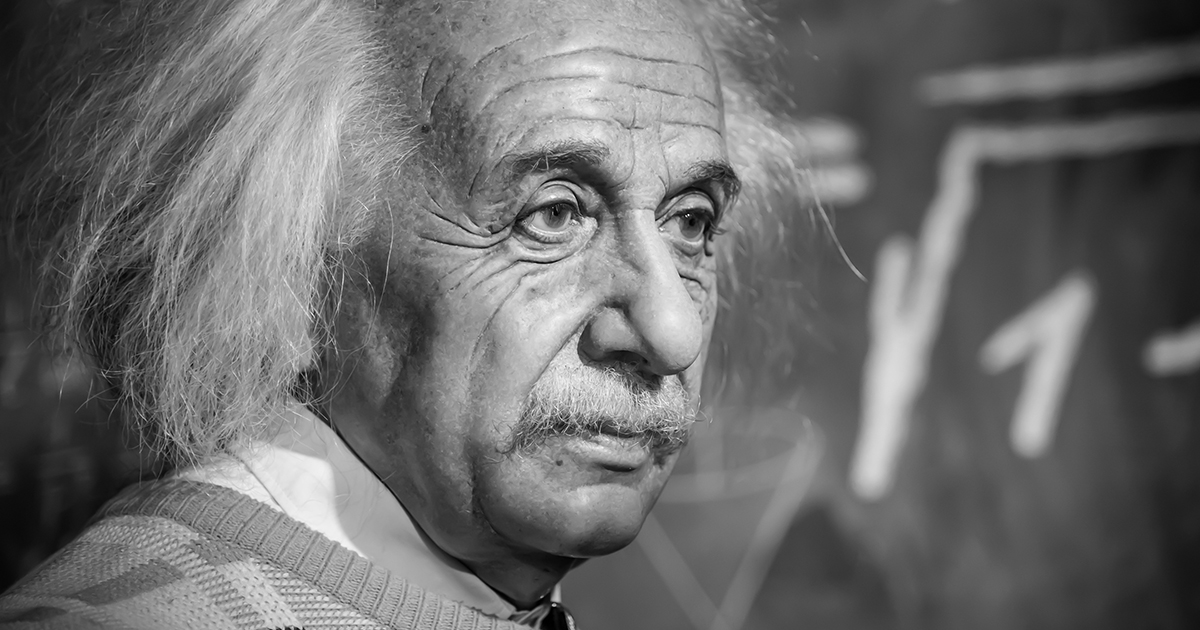Did Einstein Pray? What the Great Genius Thought about God.

What did history’s greatest minds believe in? It is a question that many of us have asked. It is a question that has undoubtedly been tossed around when somebody comes out as an atheist. While the beliefs of most celebrities are irrelevant, the religious and philosophical ideas of those famed for their intellect is a more interesting topic.
Albert Einstein’s religious beliefs are chief among these inquiries. Many people know he was raised as a Jew, and some people remain convinced of his dedication to the God of Abraham. Atheists like to include him as being one their own—being able to say that one of the greatest geniuses in world history was on your side is a nice endorsement, so it is understandable why all sides want to claim him.
But what did he believe?
In January of 1936, a school girl named Phyllis wrote to Einstein to ask whether you could believe in science and religion. He was quick to reply.
My dear Dr. Einstein,
We have brought up the question: ‘Do scientists pray?’ in our Sunday school class. It began by asking whether we could believe in both science and religion. We are writing to scientists and other important men, to try and have our own question answered.
We will feel greatly honored if you will answer our question: Do scientists pray, and what do they pray for?
We are in the sixth grade, Miss Ellis’s class.
Respectfully yours,
Phyllis
He replied a few days later:
Dear Phyllis,
I will attempt to reply to your question as simply as I can. Here is my answer:
Scientists believe that every occurrence, including the affairs of human beings, is due to the laws of nature. Therefore a scientist cannot be inclined to believe that the course of events can be influenced by prayer, that is, by a supernaturally manifested wish.
However, we must concede that our actual knowledge of these forces is imperfect, so that in the end the belief in the existence of a final, ultimate spirit rests on a kind of faith. Such belief remains widespread even with the current achievements in science.
But also, everyone who is seriously involved in the pursuit of science becomes convinced that some spirit is manifest in the laws of the universe, one that is vastly superior to that of man. In this way the pursuit of science leads to a religious feeling of a special sort, which is surely quite different from the religiosity of someone more naive.
With cordial greetings,
your A. Einstein
In his reply to Phyllis, Einstein hints at his pantheism; the idea that “God is everything“. Several times he expressed this view explicitly, telling the Rabbi Herbert S. Goldstein, “I believe in Spinoza’s God, who reveals himself in the harmony of all that exists, not in a God who concerns himself with the fate and the doings of mankind.” He went further in telling an interviewer that he was, “fascinated by Spinoza’s Pantheism.” This pantheism would form the basis of his worldview, and even influence his ideas in physics.
Ok, but what is pantheism exactly?
Pantheism can be defined as a few similar ideas. In the simplest form, it is the belief that everything is identical to God. Holders of this view will often say that God is the universe, nature, the cosmos, or that everything is “one” with God. However, some holders of the view argue that it can also mean that the essence of the divine is in everything without everything “being part” of God.
The Pantheism of Spinoza, which Einstein was most interested in, holds that the universe is identical to God. This God is impersonal and uninterested in human affairs. Everything is made of the same fundamental substance, which is derivative of God. The laws of physics are absolute and causality leads to determinism in this cosmos. Everything which happens was the result of necessity and it was the will of God. For the individual, happiness follows from understanding the cosmos and our place in it rather than trying to pray for divine intervention.
Einstein’s beliefs, though not as strong as the religious devotion of many people, were a part of his objection to the Copenhagen interpretation of quantum mechanics, as a pantheist universe operates on causality and quantum mechanics does not. He accused the quantum theorists Niels Bohr and Max Born of believing in “A God who plays dice“. Likewise, he tried to live his life in a way that reflected his lack of free will.
Albert Einstein was a pantheist who maintained certain Jewish traditions. While he noted that “From the viewpoint of a Jesuit priest I am, of course, and have always been an atheist,” he preferred to be called an Agnostic and disliked militant atheists. He considered people who anthropomorphized God to be “naive”. Ethically, he was a secular humanist.
Einstein’s views of God, life, and the universe are more complicated than people who want him on their side make them out to be. His devotion to science and reason drove him to the rationalistic worldview of Spinoza, and to a detachment from organized religion. His ideas are worth studying, as are the worldviews of most geniuses. Especially for the next time a meme goes around trying to claim him as a member of one religion over another.
Understanding Spinoza is key to understanding Einstein in this matter. So what did Spinoza think about the concept of God?





